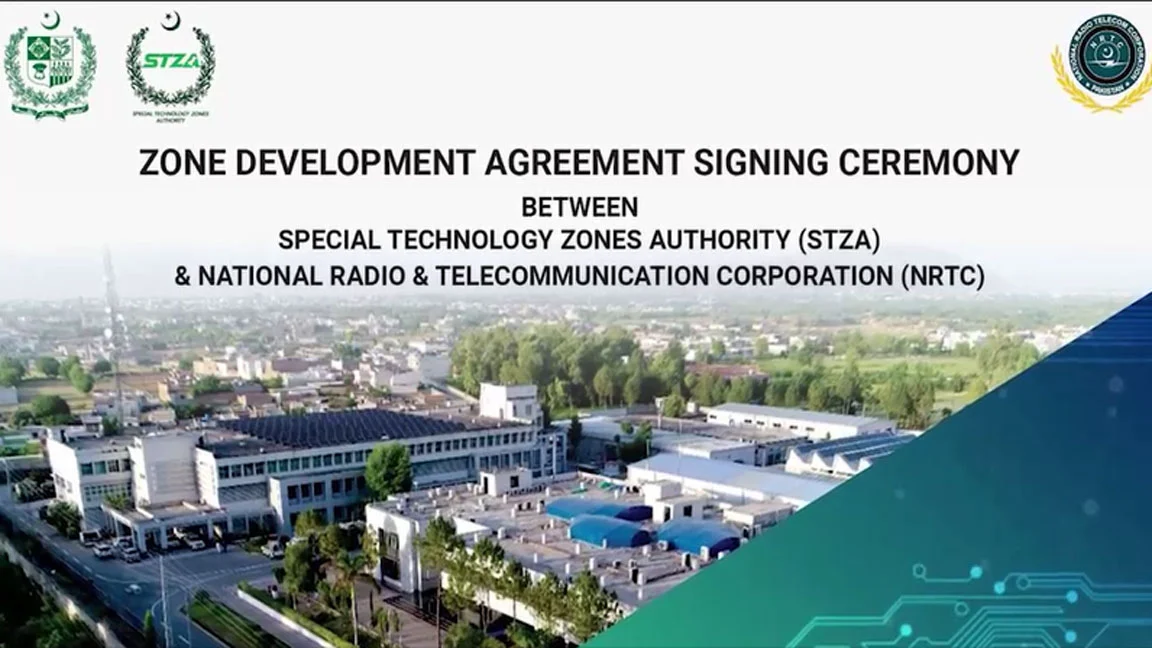
The Special Technology Zones Authority (STZA) and the National Radio and Telecommunication Corporation (NRTC) have recently inked a groundbreaking agreement worth Rs 12.5 billion, heralding a new era of technological advancement in Pakistan. This landmark deal, sealed at STZA’s headquarters in Islamabad, is poised to reshape the country’s technological landscape, propelling it towards innovation and economic growth.
The agreement, a major milestone in Pakistan’s push for technological advancement, underscores the strategic importance of the Special Investment Facilitation Council (SIFC) in Pakistan’s economic strategy. STZA’s approval of NRTC’s operational facility in Haripur, spanning an impressive 46.88 acres, signals a significant step towards fostering innovation, driving export growth, substituting imports, and generating employment opportunities.
NRTC, renowned for its specialization in high-tech production, boasts a diverse portfolio encompassing information and communication technologies, biomedical advancements, agritech solutions, robotics, power innovations, and AI-driven Internet of Things (IoT) solutions. The operational facility in Haripur stands as a testament to cutting-edge tech infrastructure, poised to accelerate Pakistan’s technological progress.
The strategic support of SIFC has been instrumental in the rapid progression of this project, highlighting STZA’s pivotal role in Pakistan’s economic strategy.
The strategic support of SIFC has been instrumental in the rapid progression of this project, highlighting STZA’s pivotal role in Pakistan’s economic strategy. The signing ceremony at STZA’s headquarters underscores a core alliance aimed at expediting the expansion of Pakistan’s burgeoning technology sector.
To fuel further growth and innovation, STZA has announced a decade-long grant initiative, inviting public and private institutions to invest in Pakistan’s knowledge ecosystem. This initiative is expected to attract significant investments, driving the development of cutting-edge technologies and enhancing Pakistan’s competitiveness in the global market.
Also Read: SIFC Driving Economic Transformation
In a parallel development, APM Terminals, a global logistics giant, has expressed keen interest in developing Pakistan’s inaugural green transshipment terminal. Led by CEO Keith Svendsen, a delegation from APM Terminals visited Pakistan to explore investment opportunities, particularly in the proposed terminal in Karachi. This terminal aims to accommodate large cargo ships, promising substantial revenue boosts for the nation.
During the visit, Svendsen lauded Pakistan’s investment-friendly policies and expressed eagerness to establish the pioneering terminal. The delegation highlighted APM Terminals’ significant global presence and its strong rapport with Pakistan, underscoring its commitment to fostering maritime advancement and skill development in the region.
This strategic move aligns with efforts to bolster regional trade and connectivity, leveraging Pakistan’s prime location. The anticipated investment by APM Terminals is expected to stimulate Pakistan’s economy, fostering employment opportunities and enhancing trade ties with Central Asian states.
In another development, Ambassador of the Republic of Turkiye Mehmet Pacaci recently paid a courtesy call on Federal Minister for Economic Affairs Ahad Khan Cheema. The meeting focused on reinforcing the longstanding brotherly relations between Turkiye and Pakistan, with a specific emphasis on elevating economic cooperation to new heights.
The establishment of a branch of a Turkish bank in Pakistan was also discussed, aiming to further solidify economic ties between the two nations. The signing of the Trade in Goods Agreement/Preferential Trade Agreement (PTA) in August 2022 was hailed as a significant step forward, opening doors for increased bilateral trade and investment.
Minister Cheema apprised the envoy about the establishment of SIFC, aimed at attracting investments from friendly countries, highlighting the potential for Turkish investment in Pakistan, especially in agricultural machinery & equipment and large-scale corporate farming. He stressed the importance of enhancing collaboration through government-to-government (G2G) and business-to-business (B2B) arrangements, emphasizing the untapped potential in bilateral trade and investment.
Ambassador Pacaci acknowledged the brotherly relations between both nations and conveyed Turkiye’s eagerness to explore avenues for expanding bilateral trade through the High-Level Strategic Cooperation Council (HLSCC) and the Strategic Economic Framework (SEF). Plans for the next session of the HLSCC, expected to convene soon, were discussed, with a focus on increasing the volume of trade to $5 billion.
The role of SIFC in facilitating investments and fostering international partnerships is crucial in driving Pakistan’s development agenda.
These developments underscore the significant strides Pakistan is making towards economic growth and technological advancement. The role of SIFC in facilitating investments and fostering international partnerships is crucial in driving Pakistan’s development agenda. With strategic initiatives and partnerships in place, Pakistan is well-positioned to harness its potential and emerge as a key player in the global economy.
In the backdrop of global uncertainties, Pakistan has emerged as a beacon of hope and resilience, showcasing remarkable economic revival and diplomatic triumphs. From forging robust bilateral partnerships to implementing visionary economic policies, each milestone achieved in this period demonstrates Pakistan’s commitment to a brighter, more prosperous future for its citizens and the world at large. One of the noteworthy highlights during this period has been the policy reforms aimed at attracting foreign investments and creating a conducive business environment, exemplified by the establishment of the Special Investment Facilitation Council (SIFC) and the introduction of Pakistan’s Investment Policy in 2023.
Economically, Pakistan has shown resilience with a current account surplus of $9 million in November 2023 and a significant decline in inflation, reaching a 23-month low in March 2024. These favorable economic indicators have sparked optimism and anticipation for potential policy easing. Additionally, Pakistan is poised to become a prominent digital hub, surpassing countries like the Philippines, China, and India in financial viability, according to a report by Kearney. The Information Technology (IT) sector has achieved remarkable growth, with the highest monthly IT exports to date in March 2024.
In the agricultural sector, Pakistan has seen a substantial increase in regional exports, particularly in rice and maize.
In the agricultural sector, Pakistan has seen a substantial increase in regional exports, particularly in rice and maize. Maize exports have surged by 195%, positioning Pakistan as a formidable competitor in the global maize industry. Moreover, significant achievements have been made in trade and investments, particularly in transportation and exports to neighboring countries like Kazakhstan, Uzbekistan, Kyrgyzstan, Russia, and China. Pakistan has effectively established connections between Central Asia, the China-Pakistan Economic Corridor (CPEC), and Gwadar port, overcoming geographical obstacles and expanding its trade network.
Furthermore, Pakistan’s integration into the global economy has been accelerated through free trade agreements with the Gulf Cooperation Council (GCC) and the Association of Southeast Asian Nations (ASEAN). The country has also strengthened its economic ties with China through five new economic corridors under CPEC Phase-II. Additionally, agreements with international organizations like the International Monetary Fund (IMF) have further strengthened Pakistan’s commitment to fiscal discipline and economic reforms, paving the way for continued stability and growth. As Pakistan moves forward with confidence, guided by its political leadership and institutions, the future appears promising, offering stability, progress, and prosperity for its citizens.
The opinions shared in this article reflect the author’s personal views and do not necessarily align with the institution’s official stance.



















Leave a Reply